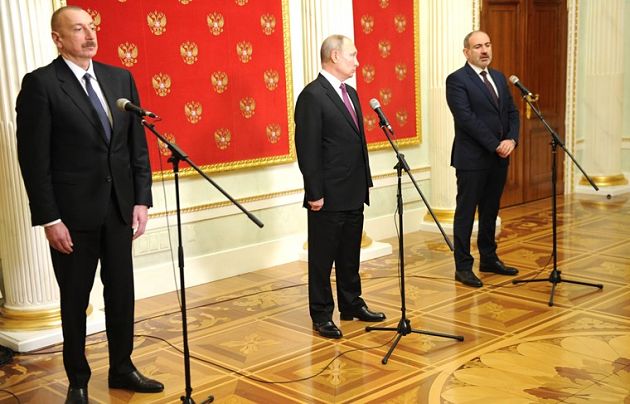The visit of the President of Azerbaijan Ilham Aliyev to Shusha, which took place today, January 15, 2020, was once again intended to demonstrate his triumph. But did it have any other political meaning? This question arises, of course, against the background of a series of events that took place this week, starting with the meeting of the presidents of Russia, Azerbaijan and Armenia in Moscow, which we reported on earlier.
On the one hand, if we talk about the specific agreements reached at this meeting, they are in the interests of Azerbaijan, Russia, Turkey and even Armenia itself, if we look at them pragmatically. Of course, we are talking about the construction of railway lines connecting Azerbaijan with Turkey through Nakhchivan on the one hand, and Armenia with Russia through Azerbaijan on the other hand, as well as Russia with Turkey through both Transcaucasian states.
On the other hand, the speeches of Ilham Aliyev and Nikol Pashinyan after the meeting once again revealed a significant difference in positions on the Nagorno-Karabakh issue. Aliyev, referring to Vladimir Putin, said: “As Vladimir Vladimirovich once said, the Nagorno-Karabakh conflict remains in the past and we should think about the future.” And this is what the President of Azerbaijan has repeatedly said since the end of the war, stating that the Karabakh issue no longer exists and is in the past. But Pashinyan disagreed, saying: “Unfortunately, this conflict remains unsolved. Of course, we have managed to ensure a ceasefire, but there are still many issues that need to be resolved. One of these issues is the status of Nagorno-Karabakh.
Looking at this conflict from different angles, one could say that words are not particularly important in this case, but the beginning of cooperation is important. It is clear that Pashinyan, criticized by Armenian nationalists as a “traitor” who “gave away Karabakh,” cannot publicly remove the Karabakh issue from the Armenian political agenda, as Aliyev does from the position of a victor. What is worrisome, however, is not so much these routine disputes as the provocative actions that follow them. For example, Armenian officials continue to publicly visit the internationally recognized territories of Azerbaijan inhabited by Armenians, where the structures of the separatist Nagorno-Karabakh Republic are still preserved, with Russian peacekeepers standing between them and the Azerbaijani armed forces.
And Armenian Foreign Minister Ararat Mirzoyan stated this week that Armenia is ready to continue negotiations on the Karabakh settlement under the auspices of the OSCE Minsk Group, noting that “the basis for the settlement of the Nagorno-Karabakh conflict lies in the principle of the right of the people of Artsakh to self-determination” and that “Armenia will continue to act as a guarantor of the security of Artsakh and defend the right of the people of Artsakh to self-determination. Furthermore, he said that “one of the priorities of the Armenian side is the de-occupation of the territories of Artsakh,” which already appears as an openly revanchist statement.
In response, the Ministry of Foreign Affairs of Azerbaijan stated that visits of Armenian officials to Azerbaijani territories without official permission from Baku are unacceptable and that “such actions may cost the Armenian side dearly”. Today, Turkish Foreign Minister Mevlut Cavusoglu also stated that permissions for visits to Azerbaijani territories, in this case by Armenian residents, should be issued by Azerbaijani authorities, not by Russian peacekeepers. Against this background, Aliyev’s not only triumphant but also bellicose statements in Shusha today do not seem surprising. “If anyone in Armenia thinks of revenge, they will see our iron fist once again. This iron fist broke their backs and crushed their heads. If they provoke us in any way, our response will be very harsh; they will regret it and face a bitter defeat… Today, in Nagorno-Karabakh, some elements who call themselves politicians are still trying to raise their heads. Let them not forget, let them not play with our patience, let them not forget the 44-day war. Or will they build an army and regain the lands? Let them try,” said the Azerbaijani leader.
On the basis of these words, his statement that the Karabakh conflict no longer exists and belongs to the past is more of an advance. They will become a statement of reality when the Azerbaijani flag will be raised in one way or another over the whole internationally recognized territory of Azerbaijan. For the time being, it is clear that this conflict is once again frozen, albeit on a smaller scale. Although discussions about the “de-occupation of Artsakh” as an official goal of Armenian policy speak to claims even on the territories that Azerbaijan has already managed to reclaim.
Under these circumstances, Putin’s policy remains ambiguous. On the one hand, he is now more interested in developing cooperation with Turkey, given the challenges that both countries may face after Joe Biden takes office in the United States. On the other hand, Putin still has an ace up his sleeve in the form of Russian troops stationed on Azerbaijani territory, under the protection of which Armenian expansionists can indulge in revanchist plans, to which Ilham Aliyev reacted today.
All this is clearly understood by Recep Tayyip Erdogan, who this week called for peaceful coexistence of Azerbaijanis and Armenians in Nagorno-Karabakh “without peacekeepers and observers”. But if this can be achieved, there will be no fish to catch in the murky waters of the Karabakh conflict. And is the Kremlin interested?

